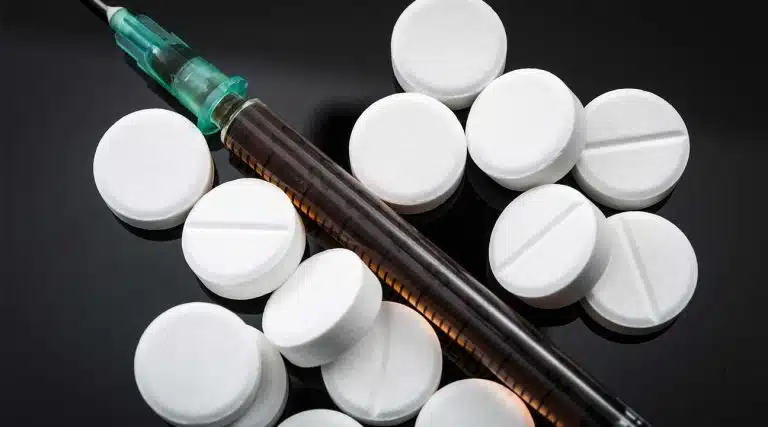Injecting & Snorting Methadone | Side Effects & Warnings
- Injecting & Snorting Methadone
- Health Effects
- Drug Interactions
- Overdose
- Addiction
- Methadone Treatment

Methadone is most commonly used to treat opioid addiction but can also be used to treat severe pain. Drug abuse is more likely to occur when methadone is prescribed for pain relief because of the tight regulations on methadone maintenance treatment programs.
Methadone is an agonist opioid that activates the same receptors in the central nervous system as drugs like morphine and heroin. However, it does not produce the same euphoric effects, unless it is taken in higher doses or abused by snorting and injecting.
Injecting & Snorting Methadone
Methadone is available as a tablet, dissolvable tablet, solution, and concentrated solution, which are meant to be taken orally.
These forms of methadone contain additives that are meant to be broken down by your digestive system. If you snort or inject it, you risk damage to your respiratory system, heart, and veins.
Injecting can produce intense sedation and euphoric effects within seconds. When you snort methadone, it will produce similar effects within minutes.
Health Effects Of Injecting & Snorting Methadone
Although snorting and injecting produces a stronger, fast-acting high, it poses several health risks.
You may intensify pain relief and sedation along with these common side effects of methadone:
- constipation
- nausea
- drowsiness
- dizziness
- stomach pain
- dry mouth
You also increase the risk of experiencing more dangerous side effects such as:
- trouble breathing
- fast heartbeat
- chest pain
- sleep apnea
- confusion
- agitation
Viral Infections
When you share paraphernalia, whether you are injecting or snorting, you are at risk for contracting Hepatitis C and HIV.
Human immunodeficiency virus (HIV) attacks your immune system, making it more difficult to fight infections.
Hepatitis C attacks your liver and may cause fatigue, nausea and jaundice (yellowing of the eyes and skin).
Abscesses
Chronic intravenous drug users may cause a dangerous bacterial infection and abscess. Abscesses are typically round and filled with pus, usually at the site of injection. If left untreated, the infection can spread into the bloodstream.
Nasal Septum Perforation
Chronic snorting of methadone can lead to sinus infections, nose bleeds, and nasal septum perforation. Nasal septum perforation occurs when the cartilage between the nasal cavities develops a hole.
Lung Infections
When you snort opioids, the drug enters your respiratory system which includes your lungs. Allergic reactions can occur when you snort methadone that can trigger infections like pneumonia.
Heart Problems
When you take methadone in high doses or intravenously, you are at risk for heart arrhythmia, which can be life-threatening.
Measurements on an electrocardiogram (ECG) can show a measurement of the duration of a heart contraction, known as a QT interval. When your heart beats too slow or irregularly, it is known as QT prolongation.
Breastfeeding
A portion of your methadone dose can be passed into breast milk and nursing infants can endure serious side effects.
If you’re breastfeeding or plan on breastfeeding, you should discuss the risks with your doctor. Those who are on methadone maintenance treatment may decide the benefits outweigh the risks of returning to illicit drug use.
Drug Interaction Warnings
The Food and Drug Administration (FDA) presents a long list of medications that may cause adverse effects if taken with methadone. The risk of these effects occurring increases when you snort or inject methadone.
These medications can induce withdrawal if combined with methadone:
- butorphanol
- carbamazepine
- nalbuphine
- naloxone
- naltrexone
- phenytoin
- ritonavir
- rifampin
- buprenorphine
- pentazocine
The following antifungal medications can increase the amount of methadone in your system, which can dangerously impact your heart rate:
- erythromycin
- ketoconazole
- fluconazole
Combining methadone with depressants can cause overdose or death. Substances that are dangerous to combine with methadone include:
- alcohol
- benzodiazepines
- hypnotic sleep-aids
- antipsychotics
Antidepressants
Certain antidepressant medications can interfere with methadone and cause your body to produce a toxic amount of serotonin, also known as serotonin syndrome. Serotonin is an important chemical that impacts mood and other bodily functions.
Let your doctor know if you take a selective serotonin reuptake inhibitor (SSRI), such as Zoloft or Luvox.
Symptoms of serotonin syndrome include:
- confusion
- rapid heart rate
- loss of muscle coordination
- goosebumps
- high fever
- loss of consciousness
Methadone Overdose
Even though methadone is intended to help opioid dependent individuals, it is possible to overdose.
When you take an oral medication, a portion of it is lost when your digestive system absorbs the drug. Snorting and injecting methadone causes is to enter your bloodstream immediately, which can result in a life-threatening overdose.
Signs of overdose include:
- cold and clammy skin
- trouble breathing
- extreme drowsiness
- slow heart rate
- low blood pressure
- loss of consciousness
If you or a loved one may be experiencing an overdose, call for medical attention immediately.
Methadone Addiction
The risk of addiction is increased when you abuse prescription drugs. If you are misusing methadone or find yourself unable to control the amount you take, you may have an opioid addiction.
Signs of drug addiction may include:
- compulsively taking higher doses of methadone
- taking methadone for reasons other than pain relief or addiction treatment
- snorting or injecting your methadone dose
Methadone Addiction Treatment
Addiction is treatable and usually begins with a medical detox. Healthcare professionals may provide you with medication to ease withdrawal symptoms.
Following detoxification, you will be given options for inpatient or outpatient treatment programs. Inpatient treatment programs are the best option for long-term recovery because they provide constant supervision.
To learn about treatment programs available through Ark Behavioral Health, contact us today.
Written by Ark Behavioral Health Editorial Team
©2024 Ark National Holdings, LLC. | All Rights Reserved.
This page does not provide medical advice.
Food and Drug Administration (FDA) - DOLOPHINE® HYDROCHLORIDE CII (Methadone Hydrochloride Tablets, USP)
National Library of Medicine - Drug Interactions of Clinical Importance among the Opioids, Methadone and Buprenorphine, and other Frequently Prescribed Medications: A Review
DailyMed - METHADONE HYDROCHLORIDE tablet
Centers for Disease Control (CDC) - Persons Who Inject Drugs (PWID)


Questions About Treatment?
Ark Behavioral Health offers 100% confidential substance abuse assessment and treatment placement tailored to your individual needs. Achieve long-term recovery.
100% confidential. We respect your privacy.
Prefer Texting?
Our friendly support team is here to chat 24/7. Opt out any time.







 Learn More
Learn More








